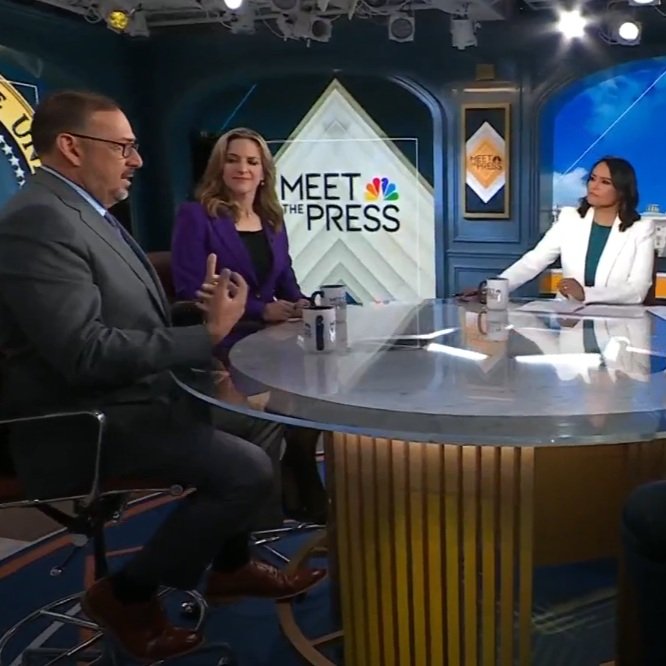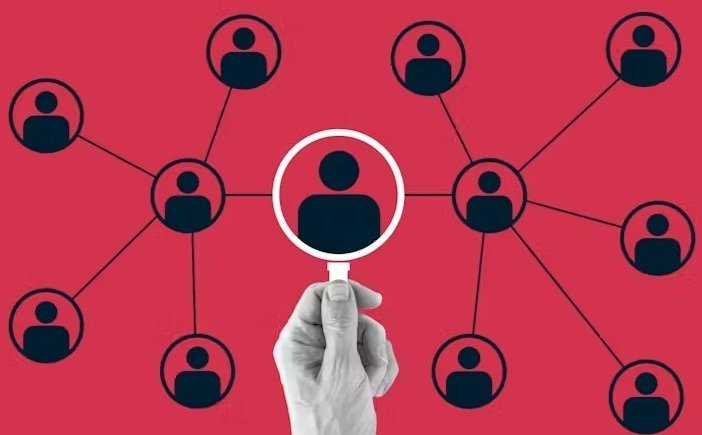More than 150 fake local news websites pushing Russian propaganda to U.S. audiences are connected to John Mark Dougan, an American former law enforcement officer living in Moscow, according to a research report published Wednesday by NewsGuard, a firm that monitors misinformation.
NBC News / NewsGuard
From fake images of war to celebrity hoaxes, artificial intelligence technology has spawned new forms of reality-warping misinformation online. New analysis co-authored by Google researchers shows just how quickly the problem has grown.
CBC News
Arizona Secretary of State Adrian Fontes joined fellow State Secretaries Sunday on NBC News’ “Meet the Press” with host Kristen Welker to discuss threats to democracy ahead of the 2024 election.
NBC News
Millions of us have played with artificial intelligence tools like ChatGPT, testing their ability to write essays, create art, make films, and improve internet searches. Some have even explored if they can provide friendship and companionship—perhaps a dash of romance.
The Brink/Boston University
Along with dance challenges, memes and an abundance of Taylor Swift fan theories, TikTok has become the home of another type of content: health information. But after conducting a study this year, two University of Chicago researchers are warning of misinformation making its way around the app.
Chicago Sun-Times
The continuing spread of anti-science sentiment and misinformation and disinformation about science has become a very dark matter, so to speak. So it would make sense to hear what astrophysicist, author, and science communicator Neil deGrasse Tyson has to say about it.
Forbes
Flicking through your social media feed, an image strikes you. It is outrage-inducing, confirming long-held beliefs about a group or an issue. You quickly repost it while stating your viewpoint, signaling to your family and friends whom you stand with. This is the kind of everyday, understandable response that has seen misinformation spread widely.
Scientific American
Nearly three of four Americans (72%) surveyed say skills in media literacy are important in the face of intentionally misleading or inaccurate information in the media, according to the new Media and Technology Survey out today from Boston University’s College of Communication conducted by Ipsos.
Boston University College of Communication
Author and ‘Sounds Like a Cult’ podcaster Amanda Montell discusses her new book The Age of Magical Overthinking: Notes on Modern Irrationality on Chicago's WGN News morning program, describing the psychology behind conspiratorial thinking and misinformation.
WGN News
Conspiracy theories are everywhere, and they can involve just about anything. People believe false conspiracy theories for a wide range of reasons – including the fact that there are real conspiracies.
The Conversation
While flooding that has devastated Brazil’s Rio Grande do Sul state has yet to subside, another scourge has spread across the region: disinformation on social media that has hampered desperate efforts to get aid to hundreds of thousands in need.
Christian Science Monitor / Associated Press
As experts warn that images, audio and video generated by artificial intelligence could influence the fall elections, OpenAI is releasing a tool designed to detect content created by its own popular image generator, DALL-E.
The New York Times
Two years after the commercial generative AI explosion began, countries across the globe are gearing up for elections that will test their defenses against a potential onslaught of AI-generated propaganda meant to undermine democracy.
Inc.
Difficulty in distinguishing fact from fiction is leading more Americans to actively avoid news. This phenomenon, termed “news fatigue,” is exacerbated by the chaotic digital media landscape and declining trust in news sources.
Neuroscience News
TikTok will begin labeling content created using artificial intelligence when it’s been uploaded from outside its own platform in an attempt to combat misinformation.
The Associated Press
The video message from Arizona Secretary of State Adrian Fontes warmly greeted the scores of election workers who had gathered at a Phoenix-area hotel in December for a first-of-its-kind drill: “We are very excited that all of you are here,” Fontes began. “You are on the front lines, and this exercise is a prime opportunity for you to hone your skills by experiencing new challenges as a team.” He wished them luck.
The Washington Post
In spring 2022, Seven Stories Press editor Greg Ruggiero read a New York Times op-ed that unnerved him. In it, University of Michigan law professor and former U.S. attorney Barbara McQuade discussed the then-upcoming state elections and how several candidates for secretary of state—the office that generally oversees voting in each state—were seeking to use the post as ‘a platform to spread disinformation.’
Publishers Weekly
Misinformation has become an epidemic in the Internet age. It undermines interpersonal trust, acerbates political polarization, threatens social order, and creates fear and uncertainty. The damaging effects are immense for individuals, communities, and society as a whole.
Psychology Today
The headlines sounded dire: “China Will Use AI to Disrupt Elections in the US, South Korea and India, Microsoft Warns.” Another claimed, “China Is Using AI to Sow Disinformation and Stoke Discord Across Asia and the US.”
WIRED
Although news consumption soared during the COVID-19 pandemic, subscriptions have since fallen, and news outlets around the world have been laying off reporters or even shutting down altogether. That is bad news for all of us.
The Independent




















